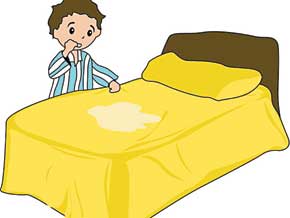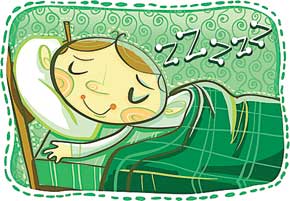Many children suffer from the common problem of bedwetting. However, bedwetting is just a phase that will pass if you take the right measures. You! takes a look...
night time
Many children suffer from the common problem of bedwetting. However, bedwetting is just a phase that will pass if you take the right measures. You! takes a look...
No matter how much you train your child to head to the toilet when nature calls; there are just some kids who can’t control wetting the bed. Soggy sheets, pyjamas and an embarrassed child; sounds familiar to you? Fret not as bed-wetting isn’t a sign of your toilet training gone bad; it is merely a normal part of a child’s development. Yes, screaming at your child won’t solve the problem till you take the problem head on. Read on as You! takes a look at how you can tackle the issue of bedwetting.
Why it happens
Bedwetting is also known as night-time incontinence or nocturnal enuresis. Generally, bedwetting before seven years isn’t a concern. At this age, your child may still be developing night-time bladder control. Remember, children do not do this on purpose or out of laziness. It often occurs because of a small bladder, delayed bladder maturation, excessive urine production, urinary tract infection, stress, chronic constipation, or hormone imbalance. Some children are deep sleepers and their brain does not get the signal that their bladder is full. Also, in a majority of cases bedwetting is an inherited problem.
About 40 per cent of three-year-olds wet the bed. Experts don’t fully understand why one child continues to wet the bed and another doesn’t. It could be a matter of development. Sometimes a child’s bladder is simply not developed enough to store urine for an entire night. Sometimes a child has not yet mastered the ability to recognize when the bladder is full, wake himself up, and get to the bathroom.
What’s normal when it comes to bedwetting?
Typically, a child becomes toilet trained between ages two and four. But there are some kids who won’t be able to stay dry through the night until they are older. By age five or six, 85 per cent of children can stay dry, but some children still wet the bed from time to time until age 10 or 12.
Sometimes a child who has been dry at night will begin to wet the bed again. This may be triggered by family stress or school problems. As a child’s system matures, he/she is less likely to wet the bed at night. By the teen years, or much earlier, almost all kids who wet their bed have outgrown the problem with only one per cent or less still having issues.
Most school going children who wet their beds at night have what doctors term ‘primary enuresis’. Family history also plays an important role; if you used to wet the bed as a child, chances are that your child will do it too.
When to reach out for help
A paediatrician should be contacted if your child has been dry and then starts to wet the bed. Your child’s doctor can evaluate your child to be sure the problem isn’t due to an underlying condition. That likelihood is small. Only one per cent of all bedwetting problems are traced to diabetes, infections, abnormalities of the bladder or kidney, or any other medical condition. If your child has any unusual symptoms such as burning while urinating or passing bloody urine, talk to the doctor right away.
To reduce bedwetting, your paediatrician may suggest a variety of measures such as limiting fluids before bedtime; prescribing medication that forces the body to make less urine at night. Normally, this isn’t an option until the child is at least seven years of age and other methods have failed.
Helping your child during the treatment
Assure your child that bedwetting in children is common. It’s nothing to be ashamed of and almost all children eventually overcome it. Make sure siblings understand this as well. Don’t allow them to tease the bed wetter. Usually, bedwetting goes with time but sometimes medical help is needed. Children often outgrow bedwetting as they age but it can be embarrassing and cause your child to shy away from social activities such as slumber parties.
It is important to treat the problem with patience and understanding. Bedwetting can be reduced by bladder training, moisture alarms or medication. You can also help your child stop wetting the bed with some easy and simple natural remedies. Here are some home remedies for bedwetting.
Cinnamon: Chewing a piece of cinnamon stick thoroughly once a day can help your child. You can also combine sugar and cinnamon powder and then sprinkle it on buttered toast. Give this toast to your child for breakfast.
Amla: Indian gooseberry, also known as amla, is an excellent Ayurvedic remedy for bedwetting. Crush and deseed two amla. Add one tablespoon of honey and a pinch of turmeric. Give one tablespoon of this mixture to your child every morning. Another option is to give your child one teaspoon of the pulp of Indian gooseberry mixed with a pinch of black pepper powder.
Walnuts and raisins: Walnuts and raisins can also be used to reduce the frequency of bedwetting. Many children will enjoy this as a tasty snack. Give your child two walnuts and five raisins before going to bed. Repeat this remedy for at least a few weeks or until you see positive results.
Bladder exercise
Bladder exercises help stretch the muscle that controls the release of urine from the bladder and increase bladder capacity. Muscle-strengthening and bladder-stretching exercises are considered good for bladder control. One simple exercise is to encourage your child to hold off going to the bathroom for some time when the urge to urinate begins. This method may be more beneficial for accidental daytime wetting than night time but can help reduce the frequency of bedwetting episodes. It usually trains the bladder to hold an increased amount of urine without triggering the urge to urinate, thus helping children to hold their urine for two to three minutes more, each day.